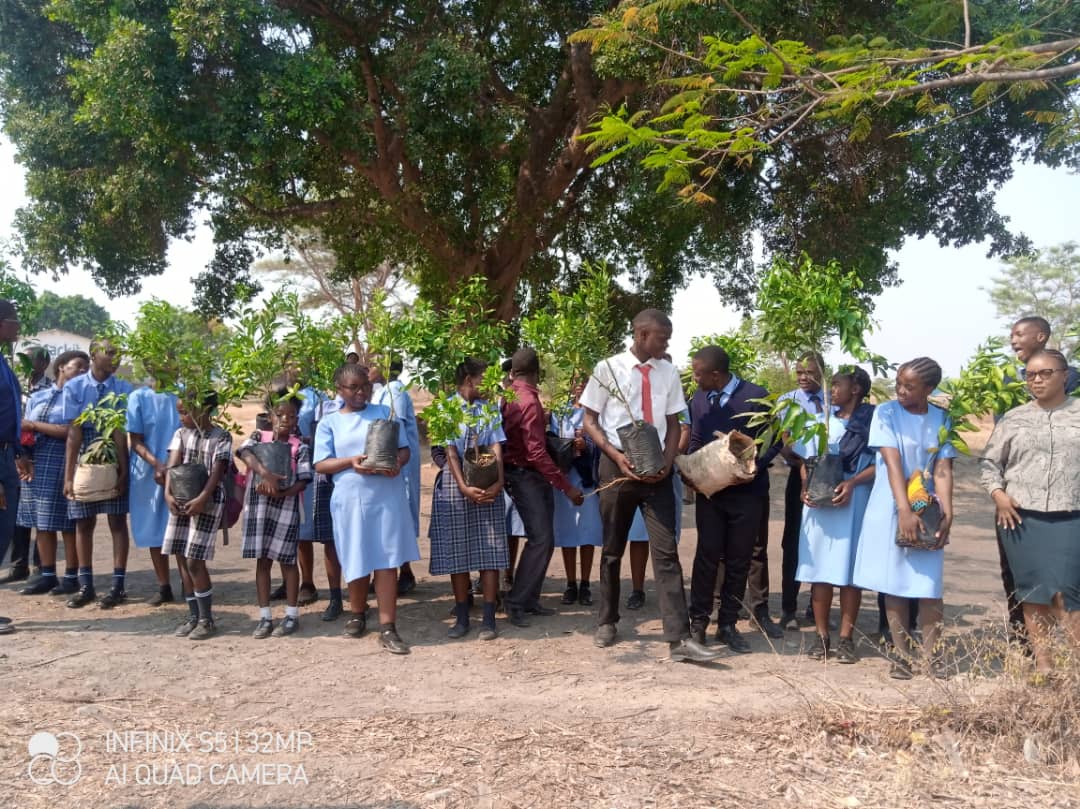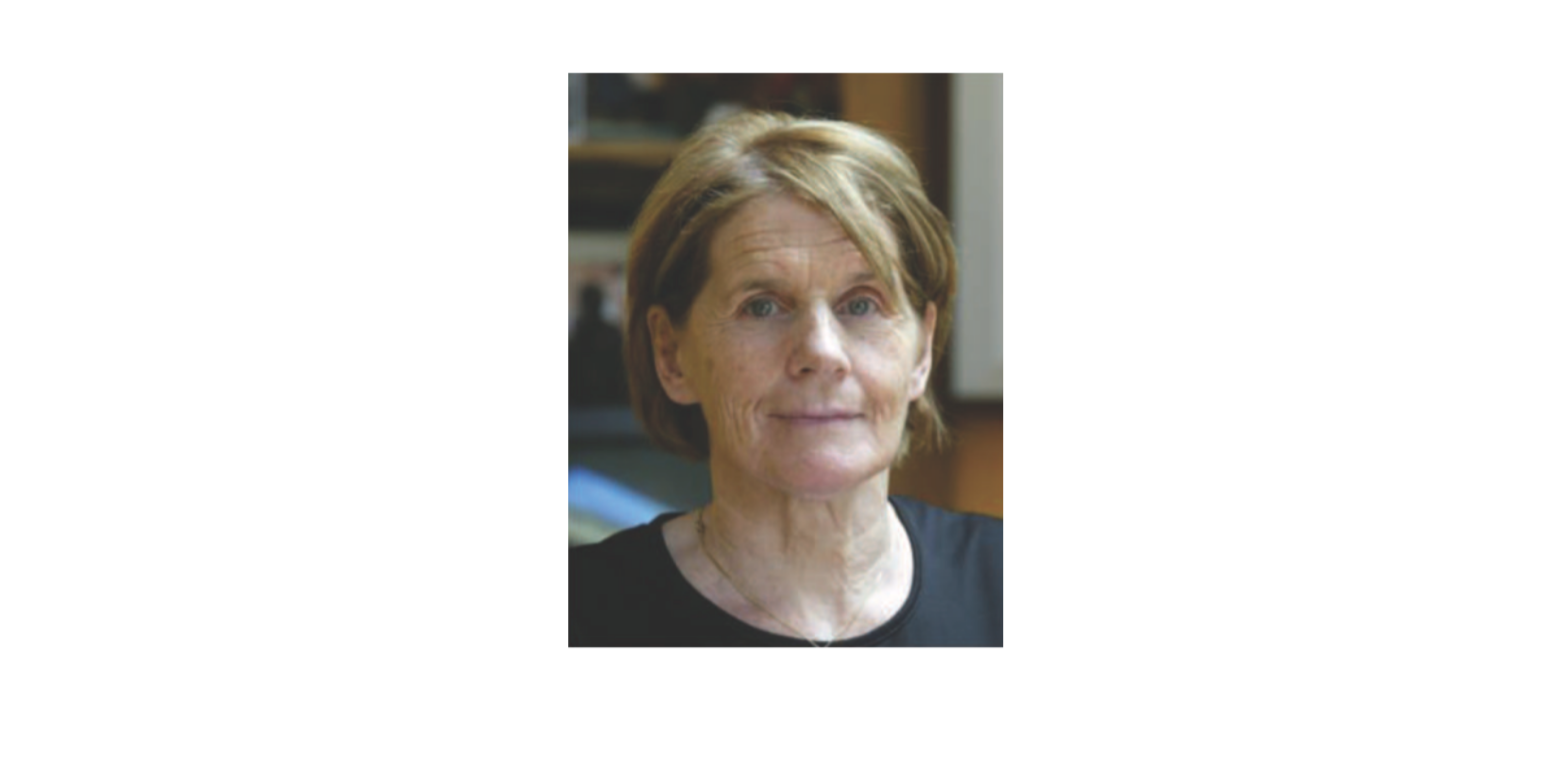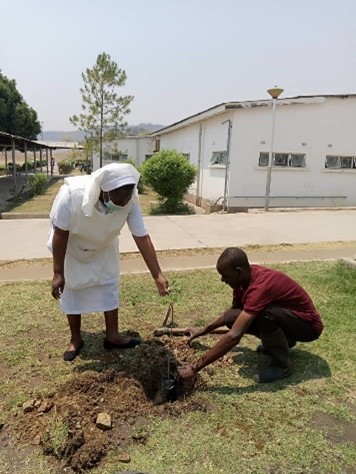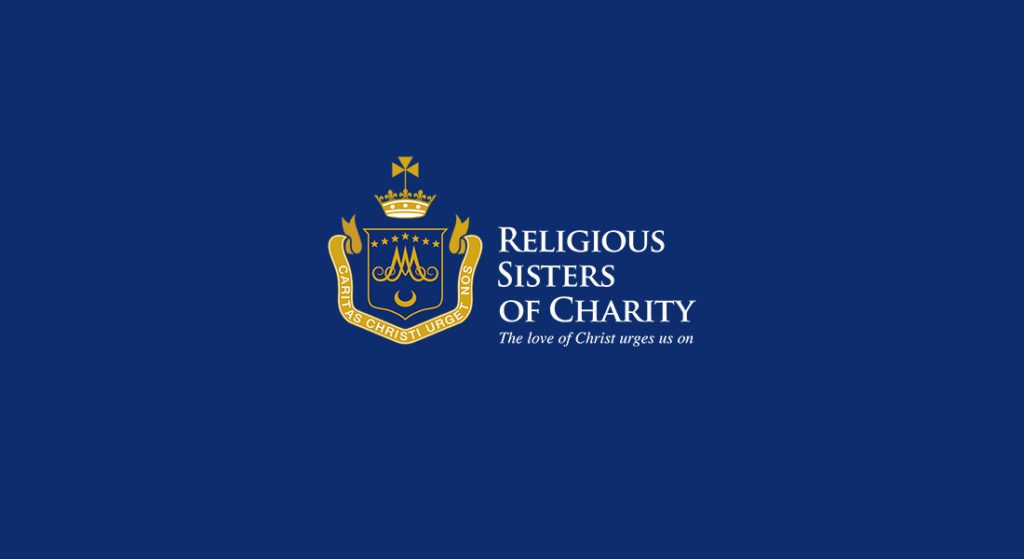
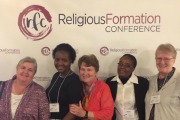 Mentoring: A Near-Occasion Of Grace was the theme of the Religious Formation Conference held in Milwaukee, US Nov. 15-20th. A group of five RSC’s were enriched and challenged by this conference and together would like to share some learnings from the workshops.
Mentoring: A Near-Occasion Of Grace was the theme of the Religious Formation Conference held in Milwaukee, US Nov. 15-20th. A group of five RSC’s were enriched and challenged by this conference and together would like to share some learnings from the workshops.
Sisters Helen Namutami, Felistus Nyirongo, Miriam Hennesey, Micheline O’Donnell and Kathleen Bryant attended. The Religious Formation Conference (RFC) attracted over 300 women and men Religious from across the globe. One of the Pre-Congress workshops was Mentoring: A Near Occasion of Grace which was designed for leaders of Congregations, vocation and formation personnel and those responsible for on-going formation programs and it was facilitated by Mary Pat Garvin, RSM. Felistus shares her experience: 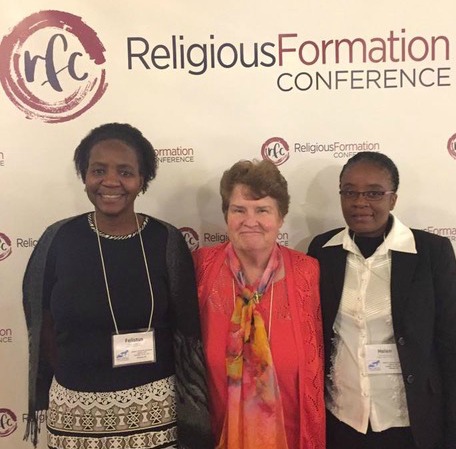 “There were many issues that came up from this talk but what resonated with me was the idea that mentoring as an occasion of grace gives the mentor an opportunity to listen to herself more because God in the process of accompanying others sends “shimmers” or glimpses or little ways of catching attention. These shimmers come in form of emotions, doubts desires, memories, surprises, questions among others. The challenge for me was to find better ways of listening attentively to self and others around me. The speaker added that mentoring presents two identity and mission critical questions for reflections by those mentored: Who/whose am I and what am I to do with my life respectively? Mentoring was also presented as a dance between mentor and mentored. However, the one mentored needs to have the capacity to learn through mentoring and the mentoring relationship needs to be mutual reciprocity. This must be internalized in the seasons of ones’ life that has both the fall and rising. This can be done in many ways like deep reflection in prayer, expressive writing or journaling, dialogue with the formator, and many other creative ways. Mentoring can only take place where relationship of trust has been built. Hence the need to dedicate ample time to building relationships between mentors and the mentored especially the sisters in Temporary profession who may be living away from their mentors.”
“There were many issues that came up from this talk but what resonated with me was the idea that mentoring as an occasion of grace gives the mentor an opportunity to listen to herself more because God in the process of accompanying others sends “shimmers” or glimpses or little ways of catching attention. These shimmers come in form of emotions, doubts desires, memories, surprises, questions among others. The challenge for me was to find better ways of listening attentively to self and others around me. The speaker added that mentoring presents two identity and mission critical questions for reflections by those mentored: Who/whose am I and what am I to do with my life respectively? Mentoring was also presented as a dance between mentor and mentored. However, the one mentored needs to have the capacity to learn through mentoring and the mentoring relationship needs to be mutual reciprocity. This must be internalized in the seasons of ones’ life that has both the fall and rising. This can be done in many ways like deep reflection in prayer, expressive writing or journaling, dialogue with the formator, and many other creative ways. Mentoring can only take place where relationship of trust has been built. Hence the need to dedicate ample time to building relationships between mentors and the mentored especially the sisters in Temporary profession who may be living away from their mentors.”
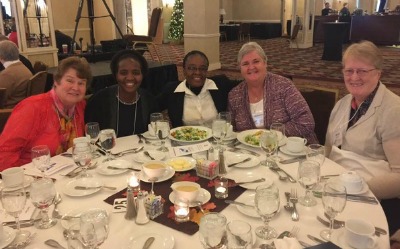 Miriam Hennesey shared some insights from her attendance at the workshop: Being Human and Sexual: An Evolving Understanding by Lynn M. Levo, CSJ, Ph.D. Consulting Psychologist.
Miriam Hennesey shared some insights from her attendance at the workshop: Being Human and Sexual: An Evolving Understanding by Lynn M. Levo, CSJ, Ph.D. Consulting Psychologist.
“We are called to the Fullness of Life. We looked at the evolving understandings of being human (our first vocation) and sexual. Jesus was committed to helping people become whole and holy. Being human is to love and be loved; to discover our gifts and give them in service; to be in relationship with mystery and to meet human needs.
Sexuality means that we are incomplete – seeking wholeness and connection. It is a sacred energy given us by God. It’s emphasis is on relationship, connection, communion, wholeness and presence to self, others and God. We need to foster qualities that help us have a healthy, integrated sexuality. We need to understand the evolving beliefs about gender, gender identity and sexual orientation. Despite shifts in attitudes and policies, sexual minorities still face high rates of discrimination, harassment, violence and suicide.
A healthy Self-Intimacy and Intimacy with others is essential.
Life for emerging adults is very different from even a generation ago. They are affected by many changes such as consumerism, moral relativism, ever present technology, identity confusion, leading to major issues in their lives.
What are the implications for our Formation Programme?
We need to cultivate Hope and Joy. See Pope Francis document – The Joy of the Gospel”
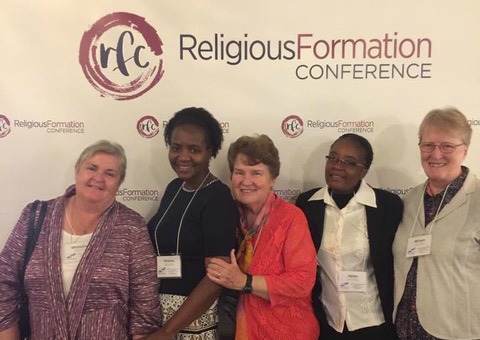 Michelline O’Donnell shares a summary from the session titled: ENCUENTRO Encounter: a call for our time – presented by Sr. Teresa Maya. CCVI, who is also the President of LCWR, Leadership Conference of Women Religious in the U.S.
Michelline O’Donnell shares a summary from the session titled: ENCUENTRO Encounter: a call for our time – presented by Sr. Teresa Maya. CCVI, who is also the President of LCWR, Leadership Conference of Women Religious in the U.S.
“Teresa Maya spoke of the Urgency of the call of each of us to Encuentro – a call to Encounter. Our world really needs the spirit of Encounter at this time.
In Encounter with people, Pope Francis is showing us the way – the least we can do is to follow him. An emerging dominant theme of his pontificate is that of ‘Encounter’. Pope Francis uses it repeatedly, urging us to go out to the peripheries, especially to the poor and marginalised.
In Evangelii Gaudium 3 he says:
‘I invite all Christians everywhere, at this very moment, to a renewed personal encounter with Jesus Christ, or at least an openness to letting him encounter them; I ask all of you to do this unfailingly every day.’ He then says ‘just come together with the other person and leave space for the Spirit.’
To really encounter others we must first cultivate our encounter with Jesus Christ. It is our encounter with Jesus Christ that makes us friends of the poor. To truly enter into the culture of Encounter, we must be prepared to leave our comfort zone; it is an outward movement towards others that is never exhausted.
To respond to a call to encounter – we must first hear it personally. It calls us to action and it is a process of never-ending movement towards other people.
This culture of Encounter needs community – a place of belonging and togetherness.
How willing are we to re-imagine formation at this time to develop this culture of encounter? How do we form new members for encounter? These are the questions and challenges for us today.”
Helen Namutami has written a summary of Religious Formation In The Way Of Justice: The Love Language Of The Bible:
“The way of justice is much more than a collection of justice. It is a disposition towards life. A disposition that realizes our interconnectedness with life. I was deeply touched by the reflection on the aspect of justice. In so far as justice is indispensable aspect of who God is, it must be of who we are as well for we are created in the image and likeness of God. Justice is the sacrament of encounter with God because the act of justice belongs to God. Therefore, it is important on us individually and as members of the congregation to live and act justly.
In his encyclical ‘Laudato si’, Pope Francis speaks of the “inseparable bond between concern for nature, justice for the poor, commitment to society and interior peace.” We are however being challenged in our efforts to nurture vocations especially to those in the formation process, to engage them in conversations with the passion for the works of social justice and peace. Our ministries are justice oriented, they are all about action as Mary Aikenhead always said “Give to the poor what the rich could get for money.” It is about challenging the structures of evil to make the world a better place.
Works of justice are non- negotiable elements of gospel commitment. We must be attentive to the signs of times. But then how do we form people in the way of justice? To practice justice we must love one another by empowering each other and allow the encounter of the significant other both in community and ministry to change me. We need the communal support in order to clarify the world ahead. We need to ask ourselves critical questions such as: when I see those living in poverty do I stop to ask why this is happening? Do I bring it into our formation conversations? The deepest level of communication is communion in which we discover our unity with God. Therefore, loving our neighbor changes patterns of behavior. It aims at eliminating oppressive systems. If love is stronger, justice must be stronger as well and if justice is who God is, then it must be who we are as well.”
Some of us attended a workshop on Personality Disorders by Raymond Dlugos OSA and learned about the difference between healthy and unhealthy personalities. One example of the wisdom Ray shared was, “If you bring a habit to a novice’s attention and they are able to admit to it and can change, that’s a good sign!” If someone has a personality disorder, they can’t see that their behavior is a problem and won’t change. “Personality disorders pull is into their web and ensure their needs are met. Their way is the way.” Sadly, religious communities are a “magnet” for people with these disorders and they will wreak havoc in our communities. Fr. Ray encouraged formators to pay attention and to trust their guts especially if a candidate leaves you in a state of disequilibrium or if every encounter leaves you upset.
Fr. Juan Molina gave a workshop on how to approach the cultural diversity within our congregations saying there is a sense of urgency needed to move from ‘otherness” to “equality. He gave us reflection models to use and invited us to put ourselves in the shoes of the other, “not because of them but because of you!” He suggested that we empower young members from different cultures/ ethnicities into leadership positions. RFC has also been encouraging communities to do the training for Intercultural Competence and Assessment.
Stephen Bevans SVD spoke on “Becoming Prophets of Encounter” using Pope Francis’ core phrase, the culture of encounter. We heard that religious are prophetic when they are people of deep joy. Stephen gave an example of community life in which the newer members suggested that instead of the weekly community meeting, they would do something different every other week. One week they would go to mingle and converse with people at the soup kitchen. The other week they invited in someone on the margins, or with a totally different life experience. One week they invited in a woman of the Moslem faith to share her experience. He encouraged us to shift our focus on what we already do to how we can invite others into what we are already doing.
Sandra Schneiders IHM and Mary Johnson SND de N presented an all day post conference workshop on “Re-Imagining Formation for Religious Life in the Future: A Sociological and Theological Analysis of Religious Life”
Mary Johnson helped us examine what social events are shaping the young adults who enter our congregations today and reminded us that they do not come as blank slates. Socialization in religious life goes both ways and we were challenged: “Are we ready to receive reverse socialization?” How will our newer members change us? The hopes of women entering today are for mission, personal and communal prayer, community and radical ministry. We were challenged to put younger people on communication committees and in vocation/formation ministry. When someone leaves the congregation, exit interviews were suggested asking: What did they see? Hear? “We need to be courageous”, Mary Johnson said.
Sandra Schneiders strongly urged all congregations to consider the necessity now of training new members in theology, not just with weekend courses but a degree in theology. “All religious need graduate level theology because it’s the forum for ministry.” She recommended that the newer members could study and live together in communities so there is peer support. Since we have fewer members entering, Sandra recommended that we validate the questions of those entering from such a different world and often entering into planet elderly.


